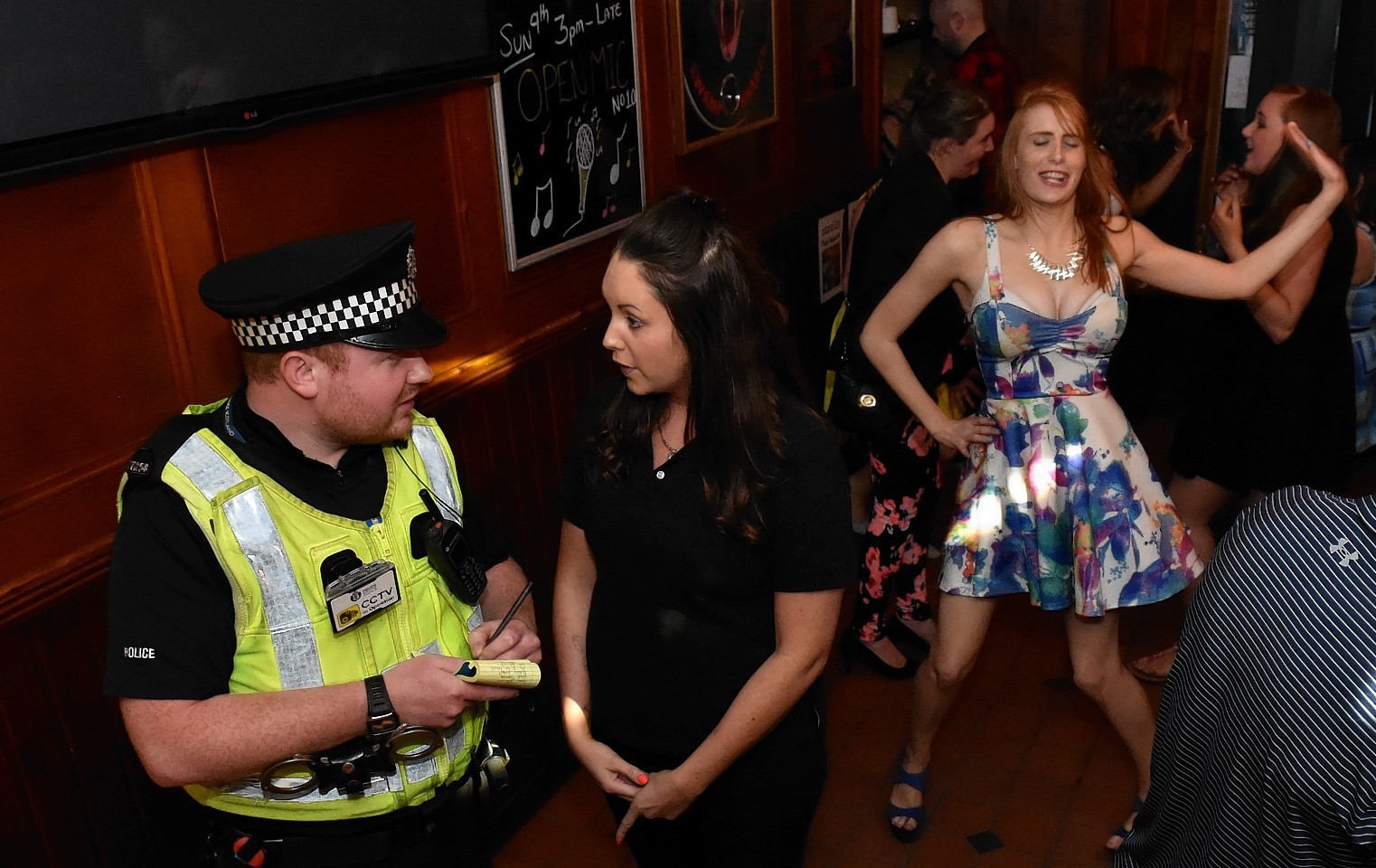It’s the weekend, and feel-good music is blasting out of the pub door.
Inside, the place is heaving with people enjoying a catch-up over a drink and in the corner, there’s a group of women on a 60th birthday night out dancing around the pool table – their Boogie Bus outside, ready to take them to their next bar.
Just down the road another of Inverurie’s nightspots is bustling with party-goers, many who will move next door to the town’s only club in the early hours.
And while the mood is jolly at 10pm, Constables Wallace Dickson and Karen Mcarthur know how quickly it can change as the evening wears on towards closing time.
Tonight they are on the late shift, from 5pm to 3am, and have been assigned to the newly-launched “green patrols” of the town centre.
The early-evening patrols, which are already carried out in Peterhead and Aberdeen, aim to remind revellers that police will be present throughout the night,
They also give officers the chance to talk to door staff and licence holders so they can get an idea of how busy the night is shaping up to be and how many staff they have on. They will also be checking the toilets for any sign of drugs.
Constable Dickson believes the patrols are a good way of breaking the ice with revellers before the drink takes hold, and may help reduce any friction should they come face-to-face later in the night.
He said: “It’s about getting out there and being seen by the punters, and breaking down barriers for later in the night. If you’ve had a bit of a chat or a laugh with someone earlier on they’ll remember you.
“If they’ve not seen the police all night, and suddenly when we appear at kicking-out time, the uniform can become a target. If we’ve already spoken to them as a friendly face, we’re not just the uniform.”
Sure enough, by the time the foot patrol reaches the Butcher’s Arms and Edwards, the two officers have been asked for several selfies and Constable Dickson has even endured some lighthearted teasing about his stubble by two heavily-bearded drinkers.
Of course, the patrols – which involve “ring-fencing” two officers to visit premises in Inverurie and the outlying areas such as Kemnay and Newmachar from about 8pm – have a more serious element, and throughout the night the officers take the licence holders aside to check everything is in order.
They also chat with the door staff, giving both sides the chance to flag up any issues or potential troublemakers.
Robert McLeod, head doorman at the Butcher’s Arms, backed the early patrols, and said: “It’s got to be about good communication.
“At least if folk know the police are going about from early on, they’ll remember to keep themselves in check at the end of the night. It’s definitely better for us to see the police early on so we can both find out if there’s anything happening, and if there’s anyone we need to keep an eye on.”
The police rely on these good relationships to ensure they are focusing their attention on the right areas, but also because the staff can often help them identify the culprit of an incident the weekend before.
Before going out on patrol, Sergeant Alun Harries meets some of the door stewards and licence holders to explain how the new patrols will work, and to hear of any issues. He also asks them for their help in identifying a youth wanted in connection with an assault, and within minutes he has a name.
“We do work hand in hand with the door staff,” the sergeant said. “We rely on them to be policing their venues, and now let in anyone who is too drunk, or to send someone who has had too much to drink out.
“These early patrols give us a high visibility, and hopefully can prevent antisocial behaviour and violence. They allow us to try and stop anything happening before it does, rather than having to police incidents that could have been avoided.”
Back on the streets, probationer Constable McHardy – who recently joined the force after five years as a nurse and a stint as a RAF driver – is experiencing her first weekend in Inverurie, which also involves policing the car park the town’s boy racers gather in.
As her mentor, Constable Dickson highlights the various powers they have to issue on-the-spot fines for offences such as refusing to leave a pub, being in a licensed premises when drunk and urinating in the street.
“It’s a useful bit of legislation as they get the punishment on the spot,” he said. “If we had to report them, a year down the line there’s no correlation between the fine they’d have got from court and their behaviour, but if we fine them immediately they realise they’ve done wrong – even if it is the next morning when they waken up and find their wallet is empty.”
